 Chapter 3
Chapter 3  Chapter 3 Chapter 3 |
Abilities |
Abilities is the term we use to describe innate powers or advantages a character may have. In most games, typical characters will have simple abilities like improved senses, social status, or an innate understanding of some subject; however, in superhero games, characters might have genuine superpowers! (Characters not in superhero games may also have superpowers, of course, but much less often.)
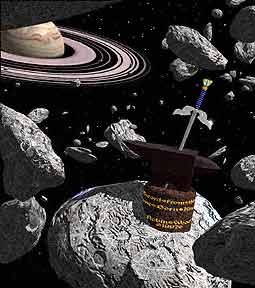 One type of ability that can be especially interesting is a latent power ability. This is a device used widely in adventure fiction. Generally, the character finds out about his power little by little over the course of his adventures. One approach to this technique is simply to give your GM a handful of points and let him spend them, without telling you what he spent them on; players who enjoy suspense will find this especially interesting!
One type of ability that can be especially interesting is a latent power ability. This is a device used widely in adventure fiction. Generally, the character finds out about his power little by little over the course of his adventures. One approach to this technique is simply to give your GM a handful of points and let him spend them, without telling you what he spent them on; players who enjoy suspense will find this especially interesting!
Before you choose your abilities, you ought to read the next chapter, "Weaknesses," and plan out your abilities and weaknesses at the same time. It is possible and even likely that your weaknesses and abilities will be related, possibly even different consequences of the same thing. (For instance, an empathetic ability, a big help when trying to understand people, might also make you feel pain when anyone around you is hurt, or it might simply make you more vulnerable to persuasion.) Also, a limitation to an ability is a weakness that you should work out with its corresponding ability.
You may not want your character to have any abilities; in many campaigns, this is entirely normal. However, many characters will have abilities, simply because heroes are usually extraordinary people! The typical hero, and thus the typical character, is likely to have one or perhaps two abilities, along with corresponding weaknesses. In Prism terms, the point cost of the abilities is usually just slightly more than the points regained with weaknesses, so that the total points spent on stats, abilities, and weaknesses add up to about 35; however, this varies widely by player, GM, and campaign.
The amount of points spent on abilities and weaknesses varies even more widely for NPCs. Some NPCs will have superpowers and usually an entire history to go with them; many others will be ordinary people; and a few will be ordinary people with a secret (perhaps not even known to themselves). Feel free to leave a handful of points unspent on some ability to be determined later, but make sure, if you do, that the ability you choose later is not one that would have been noticed beforehand (e.g., Dangersense).
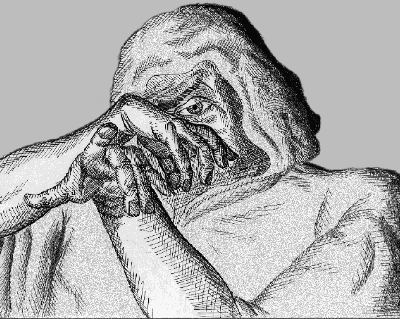 3.2 Racial Abilities and Weaknesses
3.2 Racial Abilities and WeaknessesIf the world you will be playing in includes non-human races, whether halflings, Solarians, or computer programs, you may choose to play a non-human character. In some campaigns, your GM will have some modifiers for rolled stats. He may also require that you buy certain abilities and weaknesses that all members of your race possess. For example, dwarves might be able to see in the dark and have exceptional resistance to poison; the GM might require they purchase Nightsight and Poison Resistance. Solarian star-travelers might be entirely resistant to heat, but take damage from cold. Your GM will have a list of required abilities and weaknesses for each race in his game world. All racial characteristics that have game effects should become abilities and/or weaknesses.
Odds are, in most game settings, once you've made your character, you won't be able to change her abilities and weaknesses; they will stay with her, shaping her for her entire history. For this reason, you should choose them with care.
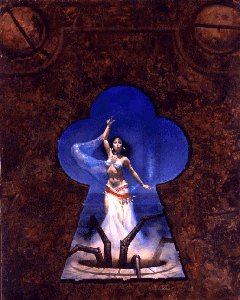 The next section provides a list of some standard abilities you can use. However, they are just samples. Many common abilities are not listed, and many of those listed are somewhat unusual; these samples are intended to illustrate what kind of abilities you can use, and perhaps to inspire some creative thinking. Rather than using them, straight from the book, you should use them as building blocks to create new abilities, or as inspirations to invent totally new ones. In fact, it is probably best not to skim this section when creating a character, but to try to let the ideas come by themselves. If you do use an ability from this section, modify it slightly to make it even more appropriate for your character.
The next section provides a list of some standard abilities you can use. However, they are just samples. Many common abilities are not listed, and many of those listed are somewhat unusual; these samples are intended to illustrate what kind of abilities you can use, and perhaps to inspire some creative thinking. Rather than using them, straight from the book, you should use them as building blocks to create new abilities, or as inspirations to invent totally new ones. In fact, it is probably best not to skim this section when creating a character, but to try to let the ideas come by themselves. If you do use an ability from this section, modify it slightly to make it even more appropriate for your character.
If you do use one straight from the book, the GM may modify it, perhaps drastically, to correspond to his game world; furthermore, he may change the point cost for any number of reasons. Make sure you check with him first.
To make up a new ability, simply write out a description of it, similar in form to the descriptions of the sample abilities, and ask your GM if you can buy it and how much it will cost. Don't forget to consider making a weakness part of the ability! By the way, your GM may deny you an ability without giving you a good reason; he may have reasons he can't tell you, so you should honor his wishes respectfully.
The following are a selection of sample abilities. Use this list to inspire ideas, not as the definitive compendium of possible abilities. Suggested character point costs are listed in parentheses after the names; your GM may use different costs.
Absolute Timing (5): You have the equivalent of an accurate alarm clock with time zone adjustment built-in. You can tell what time it is, measure elapsed time, or set alarms for yourself.
Ambidexterity (10): You can use either hand with equal ease, and suffer no penalty for using the "wrong" hand.
Animal Friendship (10): You get along well with animals; this gives you up to +25 in dealing with animals. Wild animals will be less likely to consider you a threat.
Archmage (Variable): You should only use this ability if your campaign uses Spell Law™, and if you intend to buy a MIND AV of 1. For every 25 character points you spend on this ability, you can reduce your MIND AV by one. This allows you to have a MIND AV of zero or less. See Appendix A, section A.2.2, for information about why you might want to do this.
Armor Transcendence (40): This ability only makes sense in worlds where armor interferes with magic or psionics. (Consult your GM.) You may spend an action concentrating, and as long as you concentrate on matters magical or psionic (i.e., until you do something non-magical or non-psionic) you will be able to ignore your armor, for magic/psionic purposes.
Attractiveness (Variable): Your character is especially attractive. This can come at various levels, such as:
 Bane (Variable): Your character is the mortal enemy of some race or group of beings. Her attacks against these beings are more deadly than usual; increase all her critical strikes by one level (or give E criticals a +20). The cost of this ability depends on how powerful the chosen foes are, how often you might encounter them, etc. This ability is usually accompanied by related weaknesses, such as: foes are also hunting the character; the character has a duty, vow, or quest to slay these foes; the character is vulnerable to the attack of these foes; etc.
Bane (Variable): Your character is the mortal enemy of some race or group of beings. Her attacks against these beings are more deadly than usual; increase all her critical strikes by one level (or give E criticals a +20). The cost of this ability depends on how powerful the chosen foes are, how often you might encounter them, etc. This ability is usually accompanied by related weaknesses, such as: foes are also hunting the character; the character has a duty, vow, or quest to slay these foes; the character is vulnerable to the attack of these foes; etc.
Bionics (Variable): The character has mechanical implants to enhance his physical abilities. These need not be visible: they may be concealed, or totally internal (such as an artificial blood supply resistant to radiation). The cost depends on exactly what kind of enhancement he has. Other abilities cover many possibilities. Taken far enough, this ability will make a character into a cyborg.
Calculator (5): Your character can do even the most complicated math at any time and with no effort, as fast as any calculator. She can evaluate the most complicated functions and formulae, as long as she understands them.
Charisma (Variable): Your character is easy to get along with. For every character point you spend, your character has a +1 to appropriate rolls.
Correlation (10): You have a special talent for drawing conclusions based on seemingly unrelated information. You may sit down and think about a series of clues, and the GM will give you advice based on a roll of the dice. This ability, perhaps multiplied several times, is the one that made Sherlock Holmes and most other detectives and spies the characters they were.
Data Link (10): You have a mechanical computer jack that you can plug into computer terminals to retrieve information quickly. Combined with skill at Computer Cracking, you can get access to classified information easily; you have a +25 to that skill. For an additional five points your data link can work over some communication network such as telephone. Another five points will make it work by radio, infrared, ether, or some similar communications medium, if such technology is available.
Double-Jointed (5): Since your joints move in more directions, you have up to a +25 to skills and rolls involving working free of bonds, and reaching into narrow twisting spaces (such as around the engine of a souped-up car).
Hammerhands (15): When you punch or use martial arts skills, your hands strike as if they were maces. (In Arms Law™ terms, you use the Mace chart in place of the Martial Arts Strikes chart, but still use the Martial Arts skills; note that the cutoff points for ranks 1-4 still apply.)
Innate Magic/Psionics (Variable): This is the all-purpose "superpower" ability, and you could probably use it to create most of the other abilities listed here. The character has the innate ability to do something most people must use magic, psionics, or high-tech to do. The GM must assign a cost, based on how powerful the effect is (by comparison to Spell Law™ spells, for instance), how often you can use it, whether it requires concentration, etc.
Intuition (15): You have a talent at guessing. Whenever you have to make a choice with seemingly no information, the GM will make a roll (adding your Intelligence and Perceptivity) and choose a path based on the success of the roll.
Inventiveness (25): You have a special talent for throwing together things you have on hand to make gadgets for specific tasks in a matter of minutes. You can do similar things by training in the Gadgetry skill to a high degree; however, there is a difference. This ability is a special intuition regarding mechanical relationships, and can be much quicker than the Gadgetry skill.
Language Talent (5): You learn languages more easily than most. You have an additional -3 Difficulty Modifier to any language skill, including your native language (except during childhood). You will also pick up a language at a rate of about one point per day merely by hearing it spoken frequently (for example, if foreigners are holding you prisoner). The GM will adjust this rate based on the difficulty and unfamiliarity of the language.
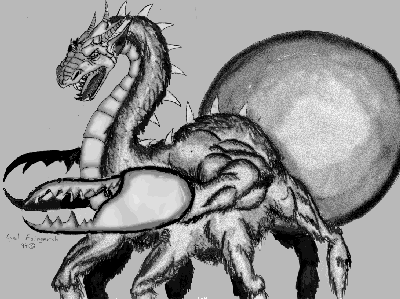 Light Sleeper (5): You sleep lightly enough to be woken easily by danger, though you still get full rest from it. You can also be fully awake in moments.
Light Sleeper (5): You sleep lightly enough to be woken easily by danger, though you still get full rest from it. You can also be fully awake in moments.
Longevity (Variable): For every character point you spend, your life span increases by 50% (ambitious GMs may want to compound this for a more realistic result). You and the GM must decide how your aging process works. This is often a required ability for members of certain races.
Luck (Variable): You are especially lucky. For 15 character points, you can make three rolls and choose your favorite, once per hour of play (real time, not game time). For an additional 10 points, the GM will choose a roll he is making that affects you (for instance, a perception roll you are making, or a foe's attack on you), once per hour, and do the same. You may want to consider purchasing plot points instead or in addition.
Machine Empathy (35): You have a special intuitive understanding of machinery. You may not have any idea how a computer works, but you have a good chance of being able to tell what's wrong with a broken one, by having a feel of something being "out of place," for example. You may also be more adept at using machines, knowing intuitively which knob to turn at a given moment. This is worth +10 to +25 to all relevant skills. This is more interesting when applied to a character who is not knowledgeable in mechanics, electronics, or engineering.
Motion Sense (15): You have a talent at intuitively understanding how bodies in motion will continue to move. This enables you to predict where projectiles will land, whether objects will collide, etc. Besides making you excellent at games like billiards and shuffleboard, it gives you a +15 to hit with missile weapons, a +10 to hit with other ranged weapons (such as beam weapons), and a +20 to hit with any thrown weapon or item. You also have -10 to be hit by missile or thrown items, but not by beam weapons or the like. You can also estimate velocities, times until arrival or collision, distances, etc. with a good degree of precision.
Odorlessness (5): You give off no smell at all. For another five points you can also mask the smells of anything you are carrying or wearing.
Pain Resistance (30): You are able to ignore pain. You can ignore any stuns, forced parries, or lost initiative effects scored on you in combat. (Note that these effects, when caused by something other than pain, may still affect you. For instance, some spells, high-tech devices, etc. may cause stuns and similar effects by other means, such as direct nervous system override.) You can also function with a negative number of Hp (hit points) up to half of your normal Hp. (Normally, you go unconscious when your Hp reaches 0, and you die when it reaches a negative value equal to twice your Endurance plus 55. Hit points are normally regained at a rate of three per hour when resting (not traveling).)
Photographic Memory (40): You remember everything you see and hear, with total recall. There seems to be no upper limit to the amount of information you can have available; you could memorize all the phone books for all fifty states, for instance. For an extra 20 points, you can memorize whole images. For example, rather than having to read those phone books, you would just have to flip through the pages, glancing at each page for a fraction of a second. The GM will remind you if you, as a player, have forgotten some fact your character had access to.
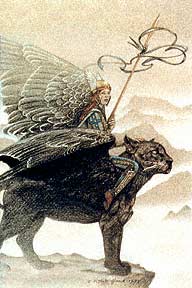 Rapid Healing (Variable): For five character points, you can double your natural rate of healing. Another five points raises this to triple your natural rate. Every additional five points will increase the rate by one. This applies to long-term healing, not regaining Hp or resisting stuns (which reflect pain, shock, and blood loss, not actual damage).
Rapid Healing (Variable): For five character points, you can double your natural rate of healing. Another five points raises this to triple your natural rate. Every additional five points will increase the rate by one. This applies to long-term healing, not regaining Hp or resisting stuns (which reflect pain, shock, and blood loss, not actual damage).
Reputation (Variable): You have a reputation in certain circles, which will affect how people react to you. (Note that this can also be a weakness, if your reputation is poor enough.) Most likely, your reputation will have different effects on different people; for instance, Joan of Arc's reputation had very different effects in France and England. The GM must determine what cost (if any) to charge for this, depending on your description of your reputation.
Resistance (Variable): You are able to resist some ill effect. Each possible resistance is a separate ability. Some possibilities include radiation, disease, poison, heat and cold, high gravity, etc. For most of these, each character point will be worth a +2 to resist the appropriate effect. High levels of several of these resistances can be invaluable to those exploring uncharted planets or planes.
Senses (Variable): You have a sense most people do not have, or a heightening to an existing sense. Possibilities include: acute hearing, sight, taste, or smell (each character point being worth +3, +2, +5, or +6 respectively to appropriate rolls); aura sight (enabling you to detect invisible foes, magic use, or moral alignment, depending on what auras reveal in the GM's world); danger sense (an intuitive "hunch" sense, costing 20; some limitations that work well are to have it falsely triggered sometimes, or have the "alarm" blare loudly in your ear during combat or other life-threatening situations); directional sense (enabling you to remember paths and know which direction leads to north or home, costing 10; an interesting alternative works in three dimensions, effective in air, space, or multi-level tunnel complexes, costing 15); hyperspace (letting you see into or out of hyperspace, the ethereal plane, or somewhere similar, costing 5); infravision (costing 8, allowing you to see heat, especially useful for finding those hiding in shadows); nightsight (which costs 15, giving you full sight in darkness); peripheral vision (costing 10, reaching anywhere but directly behind you); poison detection (enabling you to sense poison from a sip too tiny to affect you, costing 15); radiation detection (enabling you to sense radiation before being close enough to be affected, costing 15); and radio wave senses (enabling you to hear, see, or somehow detect radio waves, X-rays, or some other part of the electromagnetic spectrum; a bit of physics knowledge may be necessary to come up with interesting uses for these).
Specialized Aptitude (Variable): For any one skill, you have a -1 Difficulty Modifier (see Chapter 6) for every three character points you spend on this ability.
Special Possessions (Variable): This is a tricky ability to play, because by nature possessions are easier to lose. The GM should evaluate the power of the possessions as if they were a normal, innate ability, and then decrease the resultant cost based on how easy it would be for the device to be lost or broken. This would apply only to possessions that grant powers that would otherwise be abilities, and that last indefinitely. If the item is somehow "keyed" to the character (it only responds to his voice or fingerprint or magnoscan card, or works by remote control or will) the reduction will be less, but the item more firmly an ability of the character. Any possession permanently built into the character himself is more likely Bionics.
Spell/Psion Enhancement (15): There are several ways you can enhance your spells or psions. These include expansion (doubles the area of effect or number of targets; if the area of effect is a circle, it multiplies the radius by 1.4, which doubles the area), extension (doubles the duration), and ranging (doubles the range). These abilities apply to a Spell Law™-like system of magic only. In the RDI System of Magic, you could accomplish the same effect simply by having more skill in the various RDI skills, so you should spend the points you would have spent here on increasing your aptitude in MIND.
Status (Variable): Your character has some social status that affects how others react to him. Some possibilities include noble birth, clerical investment, military rank, police force membership, or any title. Some statuses can be weaknesses as well. This will affect the way people react to you, and will usually grant you rights beyond that of normal people in certain circumstances. Note that this is not the same as Reputation, and the interaction between the two can make for interesting characters. The chief of police can have many different types of reputation, but his status -- that is, his title and official position -- remain the same.
Synchronicity (25): You generate a field of improbability around you, where unlikely things happen to anything and anyone near you, at unpredictable times, but usually in your favor. You may not be aware that this is happening; you may even think this happens to everyone.
You might want to use a trigger to remind yourself of this ability: for example, you may apply it anytime anyone makes a roll ending in 6.
Tactical Intuition (10): You have a sense for tactics, and can use them to your advantage. This is an intuitive sense rather than a skill at understanding standard tactical strategies, and thus you may not know why you conclude something, only that you do. You may use this to ask tactical advice of the GM, to correlate strategy information to come to some conclusion about a battle or foe (such as figuring out whose side a combatant will be on before he enters the fray), or to figure out some vulnerability about a foe or force of foes.
Time Rewind (40): Your character has the ability to rewind time for five seconds (or 8 phases in IRIS); only you will remember what happened and use that knowledge to change the outcome the second time around. You cannot rewind over the same period of time more than once. In IRIS, using this ability takes an action, so you will probably want to save at least one action in every battle you enter. This, by the way, is a prime example of an ability that you could have created using the Innate Magic/Psionics ability instead.
Time Stop (40): Your character can stop time. While no time passes for everyone and everything else, five seconds will pass for your character, during which he can do anything he likes. Invoking this ability takes an action and has a +6 Delay Modifier. After the five seconds elapse, the character may not use this ability for 20+d20 seconds (30+d30 phases in IRIS terms).
Visions (10): Your character occasionally has visions which hint at future events. They may be snapshot images of dangerous or intense moments, or symbolic prophecies of events to come, but all of these will be so cryptic that it may be impossible to understand until it is too late. They usually relate to intense moments in the near future. (This ability is surprisingly fun for both player and GM.)
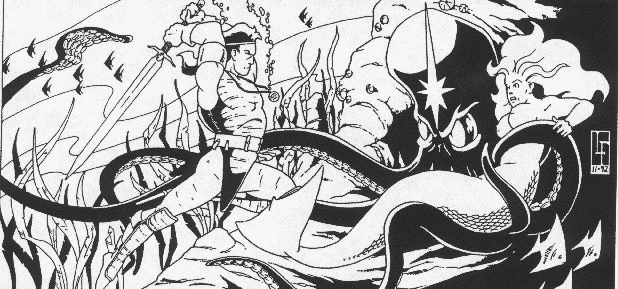 Waterbreathing (10): You can breathe water as well as air. A limitation that would cancel a lot more than the 10 points this ability costs would be requiring your character to breathe only water, not air, like a fish. This goes well with Resistances in exploring other planets.
Waterbreathing (10): You can breathe water as well as air. A limitation that would cancel a lot more than the 10 points this ability costs would be requiring your character to breathe only water, not air, like a fish. This goes well with Resistances in exploring other planets.
Wealth (Variable): Your character is wealthier than average. Multiply the normal beginning wealth by the number of character points you spent on this ability for your actual starting wealth. In most campaigns, a large part of this will be possessions like a home, appliances, etc. and for the wealthy, in the stock market or assets of companies.
Willpower (10): You have a special talent for resisting non-magical mental pressures. This gives you a +25 to resist such effects as torture, mind control, fast-talk, hypnotism, etc. This does not apply to attempts to resist the effects of your own mental weaknesses! You also have +30 to Meditation rolls.